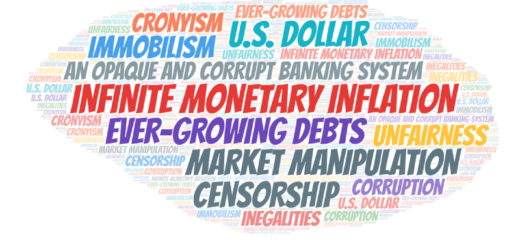Bitcoin Is a Multi-Faceted Revolution

Bitcoin is more than just a financial investment.
Many people still wrongly consider Bitcoin as a new speculative tool that only allows very attractive returns on investment. The fact that Bitcoin has helped transform $1 invested in 2010 into $90,000 by the end of 2019 is certainly not unrelated to this.
Nevertheless, Bitcoin is much more than just a financial investment that allows for juicy profits. When entering the world of Bitcoin, you need to go beyond the investment aspect to deepen your knowledge.
The more you learn about Bitcoin, the more you will realize that Bitcoin is a multi-faceted revolution. In this story, I propose to accelerate your learning by showing you different revolutionary facets of Bitcoin.
Bitcoin Is A Technological Revolution
First and foremost, Bitcoin is a technological revolution. Bitcoin is the first successful implementation of a cryptocurrency based on Blockchain technology.
Bitcoin has succeeded where many previous attempts have failed.
Bitcoin is based on a totally decentralized, permissionless and trustless Blockchain. Bitcoin has no leader and belongs to all its users.
The Bitcoin is secured by the miners who are users of the Blockchain providing the network with their computing power to allow the validation of transactions’ blocks.
Satoshi Nakamoto designed Bitcoin as “A Peer-to-Peer Electronic Cash System”.
A Peer-to-Peer system allowing its users to regain control by performing transactions without the need for a trusted third party.
The fact that Bitcoin has no leader is also essential.
Indeed, Bitcoin does not rely on the arbitrary will of a few powerful people. Bitcoin is based on its users and its open-source code that relies on mathematical properties.
Bitcoin is backed by mathematics which protect it from the arbitrary decisions inherent in human beings.
In this sense, Bitcoin is a true technological revolution comparable to what the Internet was when it first appeared.
Bitcoin Is An Industrial Revolution
From the Bitcoin technological revolution was born a true industrial revolution. Bitcoin has enabled the creation of the cryptocurrency industry.
Following the success of Bitcoin, a very large number of cryptocurrency projects have emerged.
While many cryptocurrency projects were mainly motivated by the desire of their creators to make a lot of money, some other projects that have emerged address real-world user issues.
These cryptocurrencies responding to very real problems are the ones most likely to survive in the future.
The other cryptocurrencies, those that do not respond to any problems, i.e. about 99% of the current market, will inexorably go towards zero.
Very few cryptocurrencies really address real user problems. I can give you fourteen in the following, but not much more in an instant:
- Bitcoin, which aims to be the medium of digital exchange and the digital store of value. The Bitcoin benefits fully from the first-mover advantage.
- Ethereum, which provides a complete platform of Smart Contracts and dApps already used by a large number of projects and users.
- Monero, aiming to address privacy concerns leading the field of anonymous, private and fungible digital money.
- Ripple, which aims to replace the SWIFT interbank payment system with instant transactions and reduced fees per transaction.
- Stellar, pursuing a few of the same goals as Ripple while targeting individuals with the goal of banking unbanked customers around the world.
- Factom, wanting to offer a decentralized platform for notaries.
- Golem, whose stated goal is to become a kind of Airbnb of computing power. The platform lets users sharing some computing power and is based on the Ethereum platform.
- Basic Attention Token, which aims to revolutionize the world of digital advertising with an innovative model that benefits advertisers, publishers, and users.
- Siacoin, offering a fully decentralized cloud storage platform.
- IOTA, which comes with its Tangle, a technology more scalable than the Blockchain, and which targets the Internet of Things (IoT).
- Civic, whose mission is to create a digital identity in a decentralized way for all people.
- TRON, proposing a Blockchain aimed at decentralizing the Web through the construction of a free and global digital ecosystem.
- Nexo, an instant credit line platform in cryptocurrency.
- Enjin, leading gaming platform on the Blockchain.
This list is of course not exhaustive but it cannot be extended beyond fifty or so cryptocurrencies.
That’s very little, even though more than 5000 cryptocurrencies are currently referenced on CoinMarketCap.
On the other hand, the cryptocurrency industry is full of startups offering innovative services around these cryptocurrency projects to meet user needs.
It all started with the creation of Bitcoin and the phenomenal success it has enjoyed through adoption and promotion by its first users, the cypherpunks.
Finally, Blockchain technology has become extremely popular during the 2010s thanks to the success of Bitcoin which is the most successful implementation in the field of cryptocurrencies.
The fields of application of Blockchain technology go far beyond cryptocurrencies and most industries will be impacted in the future.
Without the success of Bitcoin, Blockchain technology would not have become a fashionable concept in most industries.
Bitcoin Is An Ideological Revolution
Before the creation of Bitcoin, most people were convinced that money was the preserve of central bankers and that online transactions between individuals could only be secured through trusted third parties.
Whether they are called Visa, MasterCard or PayPal, trusted third parties seemed to be mandatory for making online transactions.
With the ingenious system developed by Satoshi Nakamoto, Bitcoin has succeeded in changing mentalities.
Bitcoin has shown that it is possible for a Peer-to-Peer payment system to exist and be secure without the need for a trusted third party.
Bitcoin is secured by the computing power that miners make available to its network in order to solve a kind of mathematical enigma at the heart of its consensus algorithm, the famous Proof-Of-Work.
With its Blockchain, Bitcoin puts users back at the center of the game.
Bitcoin should be seen as a fully democratic system that gives power back to the people.
With Bitcoin, you will not have to suffer the arbitrary decisions of a few powerful people as is the case with the current monetary and financial system.
The more you learn about Bitcoin, the more you will understand that the current system is unnecessarily complex.
Bitcoin is a major paradigm shift and constitutes a true ideological revolution whose general concepts are within everyone’s reach.
Bitcoin Is A Social Revolution
For decades, the inflationary monetary policies of Western countries, led by the United States, have drastically reduced your purchasing power.
As the U.S. dollar is the world’s currency, all monetary policy decisions made by the United States have a strong impact on other countries.
Needless to say, the repercussions are even more disastrous for the poorest countries.
In these countries, people are suffering from the tool of oppression that the U.S. dollar has become.
In the event of a conflict with a country, the United States does not hesitate to brandish the weapon of the U.S. dollar without even considering the disastrous consequences on local populations.
In Venezuela, the country is under the control of a dictator in open conflict with the United States.
In an attempt to weaken it to push it out, the United States makes full use of economic sanctions.
So far, the president of Venezuela is holding firm and it is the Venezuelans who are paying the high price of the American sanctions.
To counter these sanctions, the President of Venezuela keeps increasing the money supply of the local currency, the Bolivar, without even considering the dramatic impact on his fellow citizens.
In Venezuela, the price of a coffee rose from 0.2 Bolivars in 2017 to 30,000 Bolivars in 2019, an increase of 149.999% in just two years.
To protect themselves from this policy that constantly devalues what they own, the Venezuelans have found in Bitcoin a real bulwark.
Bitcoin exists in a limited quantity of 21 million.
This finite and fixed supply of Bitcoin guarantees them that 1 BTC bought today will still be worth 1 BTC in 10, 25 or 50 years.
By buying Bitcoin, Venezuelans, and many other people around the world are protecting themselves from the inflationary policies of their leaders.
Bitcoin is a social revolution that is still in its infancy.
If you live in the United States or in a Western country, Bitcoin protects what you own, but you may have difficulty understanding its importance as a payment system.
In Africa, on the other hand, people welcome Bitcoin with open arms and see it as an opportunity to be able to trade without having to go through the U.S. dollar, which is a real tool of oppression.
In the coming decades, Bitcoin will accompany and promote the economic and social development of the African continent.
Conclusion
In the United States as well as in Western countries, Bitcoin is mainly seen as a high-profit investment. Bitcoiners in these countries, however, have already understood that Bitcoin is a multi-faceted revolution.
The Bitcoin revolution is much more than just an investment. As I have just shown you, Bitcoin is also and above all an ideological and social revolution that seeks to build block after block a fairer world for the future.
A fairer world for the greatest number of people, something that the current monetary and financial system has never been able to do by encouraging the concentration of wealth in the hands of a tiny minority.








1 Response
[…] Bitcoin Is a Multi-Faceted Revolution […]